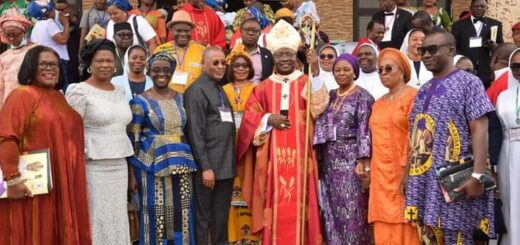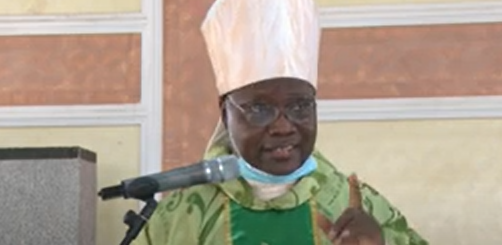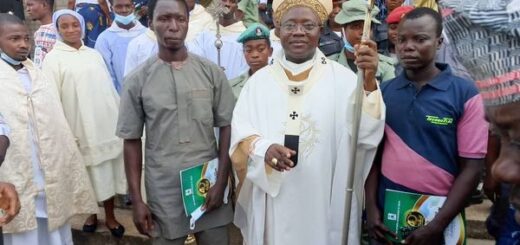The Reality of the Cross
by ARCH BISHOP · March 21, 2021
Homily by Archbishop I. A. Kaigama, Fifth Sunday of Lent at St. Matthew’s Pastoral Area, Paso, March 2021.
Readings: Jer. 31:31-34; Ps. 50(51): 3-4, 12-15; Heb. 5: 7-9; Jn. 12:20-33
Easter is knocking! Next Sunday is Palm Sunday, which begins the Holy Week. Before we get there, our readings today point to the reality of the cross. We are aware of the common saying that “no cross, no crown”. St. Paul insists, in Philippians 3:10, “I want to know Christ and the power of his resurrection and the sharing of his sufferings by becoming like him in his death”. Christians must follow in the footsteps of the one who conquered sin and death by offering His life for us, so that we may gain eternal life. The Stations of the Cross we pray especially during Lent are an eloquent reminder and a declaration that through the Cross, we can be exalted and glorified with Christ.
Prophet Jeremiah in the first reading teaches that the former covenant on Sinai and other covenants were marked by disobedience and unfaithfulness on the part of the people. He declared that the new covenant between God and Israel will no longer be external and written on stones (cf. Ex 24:11), but spiritual and written deep within their hearts (cf. Jer. 31:33).
Jewish history was often punctuated by a number of ‘covenants’ but these did not spur them to a complete change of heart. God was going to make a ‘new covenant’ with them. This New Covenant has been fulfilled through the life, death and resurrection of Christ. The second reading from Hebrews tells us that in His human nature, Jesus learnt obedience through suffering and became the source of salvation for all who obey Him (cf. Heb. 5:8-9). From the perfect example of Jesus, we learn that through suffering and fidelity to God’s will, our souls are sanctified and eternal glory is attained.
In the Gospel reading some Greek pilgrims came to Jerusalem for the Passover feast to see Jesus and approached Philip to facilitate the visit (cf. Jn. 12:21). Philip went to tell Andrew and Andrew and Philip together went to tell Jesus. The wish by the Greeks to see Jesus represents humanity’s quest and inner longing for God. We need God and we must seek Him with a sincere heart, in order to conform to His will and grow into full communion with Him.
Jesus replied them saying, “The hour has come for the Son of man to be glorified” (v. 23). He used the imagery of a grain of wheat, which bears much fruit only when it falls to the earth and dies. He teaches that the price of eternal life is sacrifice; to surrender all else for the sake of the kingdom of God. Jesus did pay the supreme sacrifice on the cross. The lesson for us is that it is only by dying to self that we live better and happy lives. A grain dies in order to regenerate, so we die every day when we stand up for justice, truth and when we say no to sin, corruption and immorality.
Jesus declared that His soul is troubled. Many things trouble us in our country – discrimination, crime, insecurity, moral decadence, poverty, disease, hunger, etc., that throw us into depression and misery. We must however take these to God in prayer and seek His help as ‘the Lord is close to the broken-hearted and saves the crushed in spirit’ (Ps. 34:18).
We must all pay attention to the voice of God in our consciences. The degree of rot and blatant misuse of public resources of this great country is because many have allowed their conscience to die. They see no wrong in their bad or evil actions and they rationalize sin and crime. Dying to self is the only way a new Nigeria will germinate and grow, free from the dominion of sin and criminality; to produce patriotic citizens who do nothing from selfish ambition or conceit, but in humility regard others as better than themselves; looking not only for their interests, but the interests of fellow Nigerians (cf. Phil 2:3-4). If Nigerians avoid politics of pleasure and the tendency of leadership without sacrifice, practise self-emptying; uproot every sinful habit and seek to be renewed in mind, spirit, soul and body, the clamour for positive change will be possible.
Unfortunately, leaders want others to die for their political ambitions; while they are comfortable with their families at home or their children well protected overseas. It is only by dying to self that good governance can be entrenched and positive legacies endure, just as Jesus in dying became the source of eternal life (cf. Heb. 5:9).
I urge the 77 candidates who will receive the sacrament of confirmation today to be real soldiers of Christ, to follow Jesus to the very end without counting the cost, and to die to self for the good of all.
I invoke God to bless you the entire parishioners of St. Matthew’s Pastoral Area, Paso, and your Priest in Charge, Rev Fr. Vincent Mokwonye. May you continue to grow in grace, and yield abundant spiritual and pastoral fruits.




